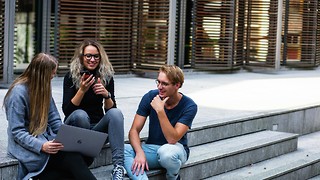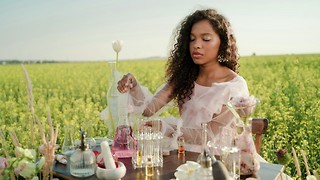Interview: Sophie Crawford
Tom Powell asks Sophie Crawford about her experiences of Cambridge theatre
During her time in Cambridge, Sophie Crawford has played Katharina in the European Theatre Group’s production of The Taming of the Shrew, played Elektra in Elektra, played Maria in Babushka both at the ADC and the Edinburgh Fringe, and performed in the 2012 Marlowe Showcase, amongst other productions.
How do you approach a role?
Well... I do like to do all the thinking about their past blah blah blah. I read the script, that’s helpful. For something like Elektra, I found it was really helpful for me to think a lot, not just about the complex of that character, but locating it in myself – how I’d react to things. I talked to a lot of people about it – I’d go and approach a lot of other directors I’d worked with and respected about what they would do with it, what they thought of the character. That might be a sign of my laziness, but I don’t want to think about that. Also locating it in really modern terms – particularly for Katharina and Elektra, who are so alienated from us, it helped to think like ‘what is she? An abused woman?’ or something in the now, in my head, so that I can then do the research and then understand what it’s like. For the Herald in the Greek play, who was coming from a horrific war, I went away and did research on shell-shocked soldiers, to see what they might be thinking.
I find the physical side is bigger than the mental side, and so before I go on as the Herald – it’s all about getting it into your body. The Herald was totally knackered, and so I’d be hunched up, or pushing against a wall. In Elektra I did a lot of jumping around back stage – I chipped my tooth one night, because I was trying to get into it. It’s vital for me to have it in my body, before I have it in my head, because once you’ve got that comfortable and natural – if your back hurts and you’re always staring at the ground, then that leads you towards what the character will be feeling like. Actually for Babushka, that was the main thing, because she didn’t really speak – so having her body language was the main thing. Knowing what you’re supposed to feel, that’s it.
What do you find most rewarding about acting?
There’s an adrenaline rush. It’s quite therapeutic to be – it sounds really weird – but to be kind of opened up on stage, it’s amazing, you can be incredibly honest. On stage I love the openness you can get with other people. Also, there is a huge part of it that’s having an audience watching you do something (potentially well). I really enjoy it.
Did you ever think of doing anything else in the theatre?
I suppose I’ve always had quite a cynical approach in my ability to produce anything actually worthwhile. So I think I’m quite lazy and acting is kind of the lazy option – in the same way that singing is the lazy option, you don’t have to do all the admin or the organising. I loved the idea of being someone who can just go away and work on it, can do what they’re asking of you. I did a show called Babushka – that was a treat because I didn’t have to learn any lines, and the whole play there were people telling me what I had to do – it was bloody great, I didn’t have to do anything!
What’s your proudest moment in Cambridge theatre?
I suppose when I first started I was really proud just to be doing it – so I was wide eyed and didn’t know much about the Cambridge drama scene. I was completely overwhelmed by it all, I loved doing that. And I was working with James Walker – who I admire hugely as an actor, so that was incredible.
Doing Elektra was big – because we all put so much into it, and that part was never off stage. I hadn’t realised until we finished doing it how much of the part had been absorbed into my head. You don’t realise how much you’re being absorbed by something – I found myself very stressed and weirded out by stuff – I was genuinely changing with the part I was playing.
Finally, the Cambridge Greek play was pretty big, just because that was such a feat of remembrance. I couldn’t believe I was doing it at all – I was speaking Ancient Greek on stage, when I went off I had to dunk my head in a bucket of water.
What’s the thing you’ve found most difficult at Cambridge?
I know it is for a lot of people, but balancing work and shows has never really been an issue for me – because I’m quite brutally practical about things. I suppose the level of involvement in a show is the hardest, because I’m usually quite distant from things but it’s hard not to become emotionally attached, and as I said, to let the person who you’re playing bleed into yourself a bit. For example, if you’re playing a character that’s beaten up, it’s so difficult to not start feeling massive resentment towards the person in the show whose character is doing that – you have to work to not feel hatred towards them. I really struggle sometimes to confine that to the rehearsal space. Thankfully I’ve never shown that outside, but I do find that my relationships with people can really be impacted upon depending on what I’m playing with at the time. Maybe that’s more difficult for the people I’m working with than necessarily me, but that – I do find it really hard sometimes not to confuse the two, because you’re having to play it every night, absorbing it into yourself.
Any regrets?
The only thing I regret is that I should have been a lot more outspoken than I was in some shows. With a show like The Taming of the Shrew, I wish I’d spoken up from the first rehearsal and said what I thought about the character, and just laid it out, it would have saved me a lot of pain, literally physical pain, and difficulty and frustration on stage if I said what I thought. I tend much more to suffer in silence and hope that someone notices. I regret not realising that I have a right to speak and valid things to say. Just being assertive, being confident – I wish I’d done that earlier.
What advice to any if you could give your first-term self?
I started as a choral scholar, so I’d say – leave the choir immediately and start doing shows. That’d be the main thing. I’d like to tell myself to be less shameless, but I think the shamelessness was probably necessary. And don’t be so bloody thankful – people are equally glad to work with you!
 News / British Academy elects 12 Cambridge academics22 July 2025
News / British Academy elects 12 Cambridge academics22 July 2025 News / Lord Smith elected Cambridge chancellor23 July 2025
News / Lord Smith elected Cambridge chancellor23 July 2025 News / Right-wing group calls for charges over Balfour portrait vandalism24 July 2025
News / Right-wing group calls for charges over Balfour portrait vandalism24 July 2025 Lifestyle / Keeping the spark alive (platonic edition)24 July 2025
Lifestyle / Keeping the spark alive (platonic edition)24 July 2025 Comment / Stop disarming people of their nuance23 July 2025
Comment / Stop disarming people of their nuance23 July 2025







